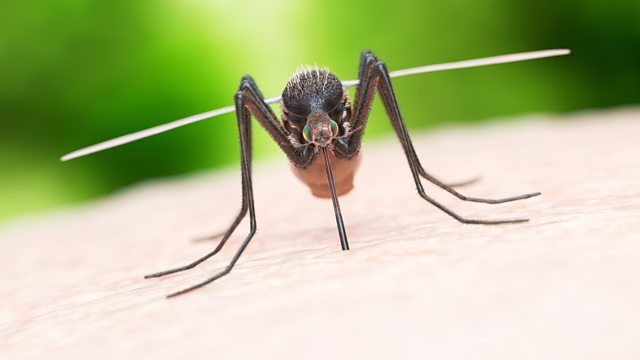Making human blood deadly to mosquitoes
We assess a novel technique to combat malaria
Antiparasitic drug Ivermectin has been shown to reduce malaria transmission by making the blood of treated persons deadly to the mosquitoes that carry the disease. Journalist Layal Liverpool explores the impact this new approach could have.
Six months on from President Trump’s dramatic cuts to US foreign aid, the HIV/AIDS relief fund PEPFAR hangs in the balance. We hear how the cuts have impacts one HIV clinic in Thailand and Devex correspondent Andrew Green unpacks the bigger picture.
Could a temporary tattoo help combat drink spiking? We hear how it works and consider if anyone would actually wear one.
A new neuroscience project is training non-specialists in India and Tanzania to gather brain data using portable headsets. Dr Tara Thiagarajan from Sapien Labs explains how diversifying brain data sets, which are often biased towards western populations, might improve health outcomes.
How we sweat and why it matters. Layal and Claudia unpick new research that suggests sweat rises like a tide inside our skin.
Presenter: Claudia Hammond
Producer: Hannah Robins
Assistant Producer: Alice McKee
Last on
More episodes
Next
Featured
-
.
Broadcasts
- Wed 30 Jul 2025 19:32GMTÃÛÑ¿´«Ã½ World Service
- Wed 30 Jul 2025 22:32GMTÃÛÑ¿´«Ã½ World Service Europe and the Middle East
- Thu 31 Jul 2025 04:32GMTÃÛÑ¿´«Ã½ World Service Australasia, Americas and the Caribbean, South Asia & East Asia only
- Thu 31 Jul 2025 12:32GMTÃÛÑ¿´«Ã½ World Service
- Sun 3 Aug 2025 01:32GMTÃÛÑ¿´«Ã½ World Service
Podcast
-
![]()
Health Check
Health issues and medical breakthroughs from around the world.


